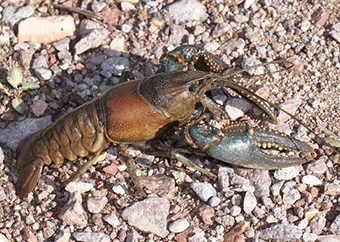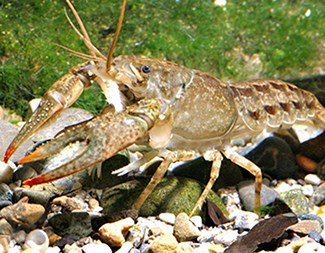|
Crayfish...crawfish...crawdad...freshwater lobster...mudbugs...yabbies...they're all the same critter! There are over 500 species of crayfish, but only one type has been observed at Pipestone National Monument. During macroinvertebrate sampling to monitor the health of Pipestone Creek, Northern Crayfish of varying ages were collected. While the Calico Crayfish has not been observed within the monument's boundaries, the species does occur in the region. It is therefore possible that Calico Crayfish may occasionally enter the waters of Pipestone Creek. (To learn more about monitoring Pipestone's aquatic invertebrate community, check out the article at the bottom of the page.) 
Alan Schmierer, Public Domain/USGS Size: Approximately 2" to 5" long, with males typically being larger than females Appearance: Reddish or olive brown coloring with paired black blotches on their abdomen. The green (sometimes blue-green) pinchers have dark specks with orange or orange-red tips and yellow bumps on the sides closest to the head. Diet: These omnivores are not picky - they eat plants and animals that are either dead or alive. What's in a name? The word "crayfish" comes from the Old French word, escrevisse, and was altered due to its association with "fish." Crawfish is the American variant. 
Photo by Chris Lukhaup, courtesy of the Missouri Department of Conservation Size: 1.75" to 3.5" Appearance: Grayish-green with a pale area along the abdomen and carapace. The pinchers are orange-tipped, but mature males will have a purple tinge on them as well. Diet: Plants and animals (dead or alive) as well as algae. As complicated on the inside as they appear on the outside: While humans have 46 chromosomes, crayfish have an impressive 200! Within all of that genetic information is the ability to self-amputate limbs if caught and re-grow them over the course of future molts. |
Last updated: March 17, 2019
